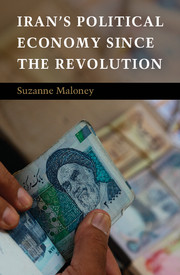Book contents
- Frontmatter
- Contents
- 1 Introduction
- 2 The Prelude: The Political Economy of Prerevolutionary Iran
- 3 The Economics of Upheaval, 1977–1980
- 4 The Cost of the Sacred Defense, 1980–1989
- 5 The Reconstruction Jihad, 1989–1997
- 6 Ayatollah Gorbachev: Reform within the Red Lines, 1997–2005
- 7 Populism, Version 2.0: The Ahmadinejad Era, 2005–2013
- 8 Energy and the Islamic Republic
- 9 Sanctions and the Sacred State
- 10 Conclusion
- Appendix
- Selected References
- Index
8 - Energy and the Islamic Republic
Published online by Cambridge University Press: 05 August 2015
- Frontmatter
- Contents
- 1 Introduction
- 2 The Prelude: The Political Economy of Prerevolutionary Iran
- 3 The Economics of Upheaval, 1977–1980
- 4 The Cost of the Sacred Defense, 1980–1989
- 5 The Reconstruction Jihad, 1989–1997
- 6 Ayatollah Gorbachev: Reform within the Red Lines, 1997–2005
- 7 Populism, Version 2.0: The Ahmadinejad Era, 2005–2013
- 8 Energy and the Islamic Republic
- 9 Sanctions and the Sacred State
- 10 Conclusion
- Appendix
- Selected References
- Index
Summary
In March 1979, when Iran's nascent Islamic Republic resumed crude oil exports after sixty-nine days of revolutionary disruptions, it seemed to herald a new era. Iranian oil workers had played a central role in driving the shah from the throne, and issues related to Iran's oil sector had mobilized Iranian oppositionists for nearly half a century. A government established through popular action now had not simply authority over the formidable instruments of state power, but also – for the first time in Iran's history – unqualified authority over the country's foremost asset, its petroleum endowments.
From its outset, the Islamic Republic realized the objective that had eluded the determined efforts of Reza Shah, Mosaddeq, and Mohammad Reza himself. At the ceremony that marked the resumption of exports, Hassan Nazih, a human rights lawyer who initially led the postrevolutionary national oil company, became emotional at the revolution's early achievement. “This is the greatest moment of my life.… I hope it is an omen of a bright future for our country and our people.” Unfortunately, Nazih's optimism proved premature. He was quickly purged for ideological differences, and the new state's sway over the country's incredible resources has not translated into the propitious future that he envisioned. Instead, Iran's oil production has never returned to its prerevolutionary heights, and the sector has been battered by government policy, sanctions, war, and political risk.
The energy sector is ground zero for all of the revolutionary state's dilemmas. It represents the wellspring of modern nationalism and continues to generate the bulk of Iran's foreign exchange, as well as its access to and prominence within the global economy. The Islamic Republic's founders sought to reconfigure the role of energy in the postrevolutionary economy, so that the country's new authorities maintained a decisive upper hand over the international oil companies, as proxies for Western power, and the sector's revenues were used to advance Islamic values and sustainable growth, rather than exploitation, immorality, and the monarchy's apish ambitions.
- Type
- Chapter
- Information
- Iran's Political Economy since the Revolution , pp. 368 - 427Publisher: Cambridge University PressPrint publication year: 2015



